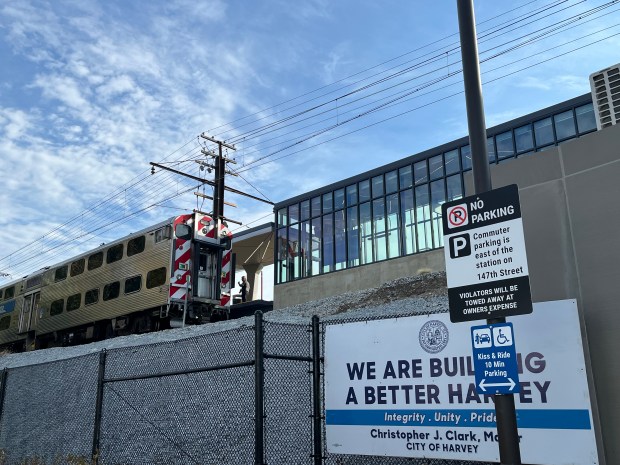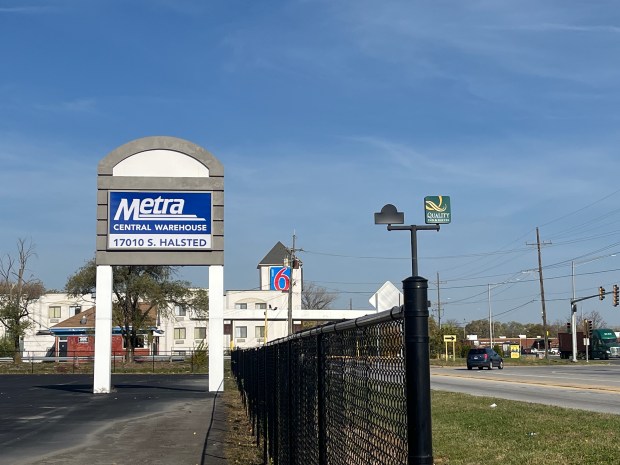More than four years after Metra Rail purchased its first used building, a warehouse in Harvey that sits on 10.5 acres, the agency is moving forward with plans to transform the unfinished site into a storage facility for rail equipment.
The transportation agency, which operates commuter trains in Chicago and the suburbs, cleared a major hurdle in its development plans after the Harvey City Council rezoned the site Oct. 28.
Previously designated for a mix of light manufacturing and highway commercial use, the property, which once housed Wickes Furniture, was rezoned entirely for light manufacturing.
Metra CEO Jim Derwinski said plans for warehouse design should be completed by spring.
“Next is the design, then take a look at the value engineering to see what has to be done,” he said. “Right now, our design criteria is like, let’s build a good year investment and then just determine whether or not we need it all.”
Board members decided to move the design to 30% completion by spring to gain a clearer understanding of the expected construction costs, according to a recording of the May 15 board meeting.
Metra chief of staff Janice Thomas told board members in May the agency aims to complete construction within the next three years, with work slated to begin in the fourth quarter of 2025.
Metra plans to make the Harvey warehouse its central hub for storing rail equipment. Located just northwest of the Interstate 80 interchange at Halsted Street, the property was purchased in 2020 for $6.8 million using state Rebuild Illinois bond funds, according a report shared with Metra board members in June.
More than four years later, including the purchase cost, Metra has invested $17.9 million into the facility, with more expenses anticipated before completion, the report shows.
The funds spent included resurfacing the parking lot, asbestos abatement, installing security cameras, painting, roof replacement and signage, the reports shows.
Derwinski told board members the 153,934-square-foot warehouse was purchased “as is” without a prior inspection, prompting questions from the board in May.
“In hindsight, we’ve certainly learned a lot on this project,” Derwinski told the board. “This is Metra’s first purchase ever of a building like this in its history. We’ve purchased railroads but we’ve never purchased a building, a used building. So absolutely, in hindsight, we found that our processes … have to be improved if we are to purchase any more buildings.”
The property, previously owned by LDN Investment Group and Summit Laboratories, was sold to Metra in 2020, according to the sale agreement. The warehouse was acquired to address the agency’s need for additional space to store rail equipment, as its four existing storage facilities, totaling about 70,000 square feet, were operating well beyond capacity, according to the purchase agreement.
“We’ve needed it. I mean, it was a great opportunity to buy it during the pandemic,” Derwinski said. “And we’re looking forward to seeing that thing actually get filled back out again, and then what’ll happen is a lot of the material will end up getting brought to their warehouse, centralize it, and then it’ll open up opportunities in all the shops that are right now overcrowded.”
At the May meeting, several board members questioned keeping the property, citing concerns it was draining Metra funds. Some members also expressed frustration with Harvey regarding delays in securing rezoning approval, which was requested in April but not granted until October.
“It’s absurd, we’ve had no cooperation, we’ve been sitting on this for five-plus years now and we’re going to put another $30+ million into it,” said board member Kenneth Koehler. “I say sell it, get out of there and let’s move on.”
Metra, in a June report, identified five potential properties within 30 miles of Chicago that could be purchased if the agency decided to sell the Harvey warehouse. Despite having invested $17.9 million into the property, the report states a Metra appraiser, after consulting with commercial brokers, determined the property’s value is between $9.2 million and $10.4 million.
Despite the board’s apprehension with continuing to invest funds in the property, Derwinski said he never planned to sell.
“The board said a lot of things,” Derwinski said. “Ultimately, it came down to moving forward, to get the 30% design done.”
Board members also questioned who purchased the property and whether there was a relationship with the seller, Summit Laboratories, that may have influenced the decision.
The questions arose after board members learned Metra made two emergency purchases of hand sanitizer from Summit Laboratories seven months before the sale, which was finalized in October 2020.
According to procurement records, Metra approved the purchase of nearly $750,000 worth of hand sanitizer — almost 382,000 bottles — from Summit Laboratories in March 2020.
The June report addressing questions about the property and its purchase stated there were no known connections between Metra and the seller, other than the transaction involving hand sanitizer during the pandemic and purchasing the warehouse.
At Metra’s July meeting, board member Mimi Rodman said the agency formed a three-member working group to facilitate information about the Harvey warehouse project.

Rodman said they found Metra’s warehouse needs are significant and must be addressed so the rail service can continue to deliver quality service.
“We’ve found no indication, based on all of our work, that there are any ethical concerns in Metra’s purchase and development of the Harvey warehouse,” Rodman said.
While Metra moves forward with plans, the agency has also funneled money into upgrading several stations along the Metra Electric Line, including a $20.8 million project to rebuild the 147th Street/Sibley Boulevard station in Harvey, which opened in October.
The Chicago Tribune’s transportation reporter Sarah Freishtat contributed.
smoilanen@chicagotribune.com





